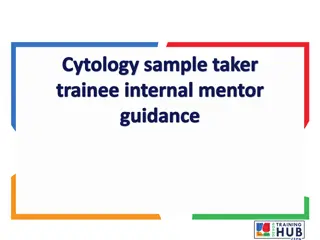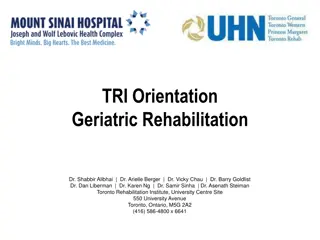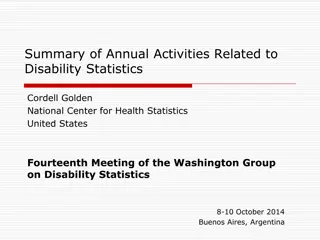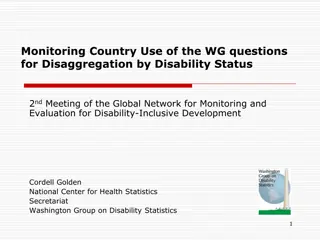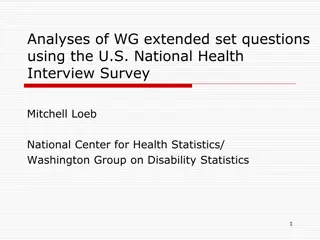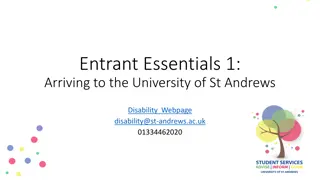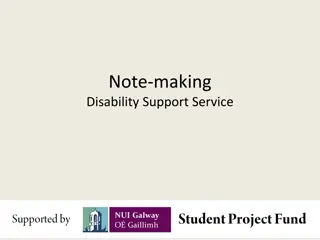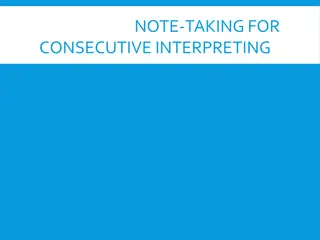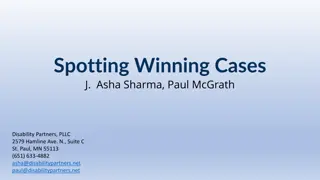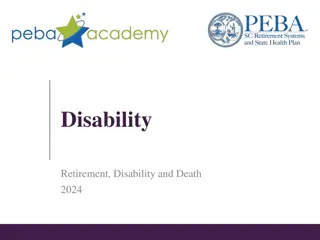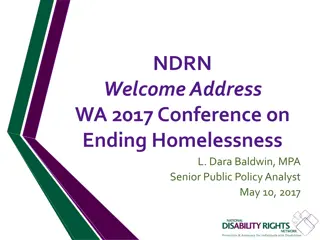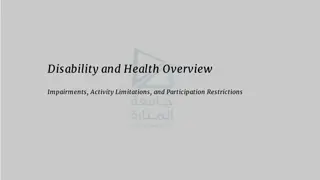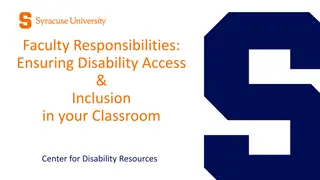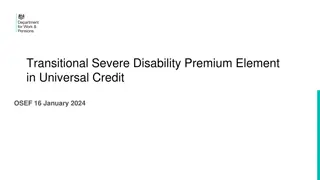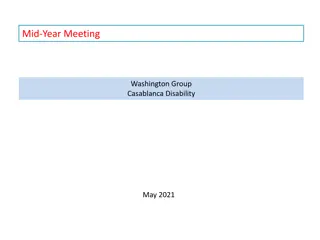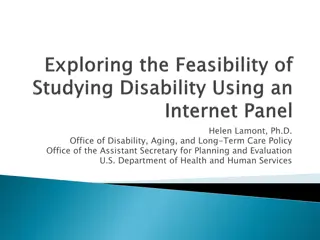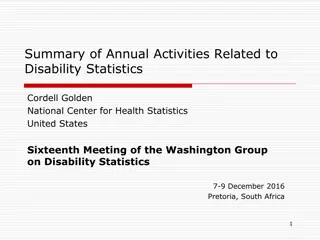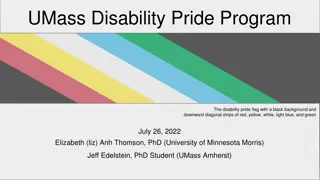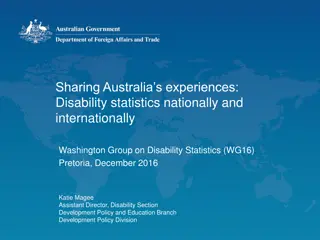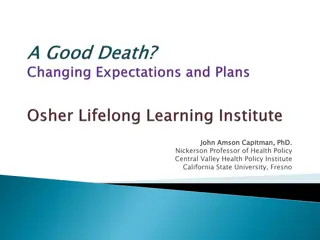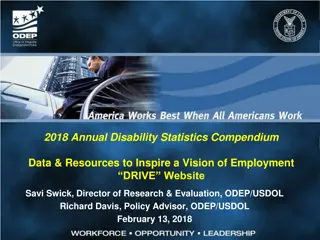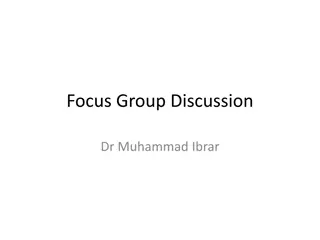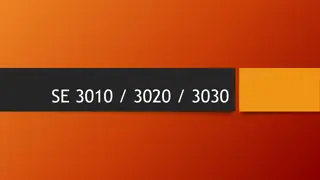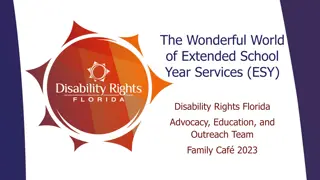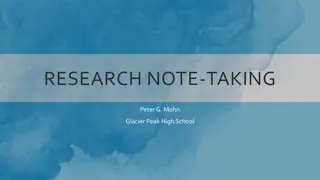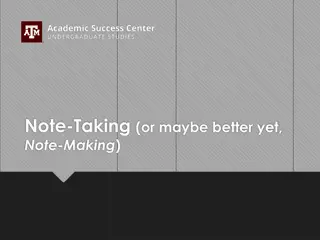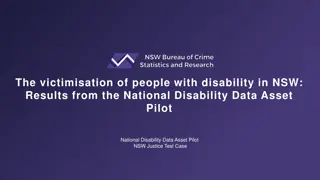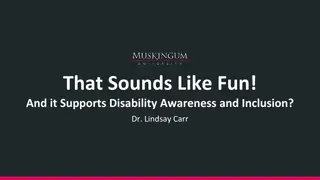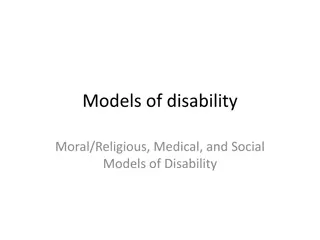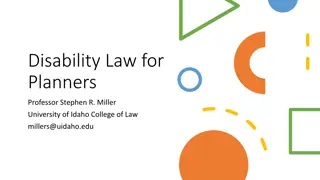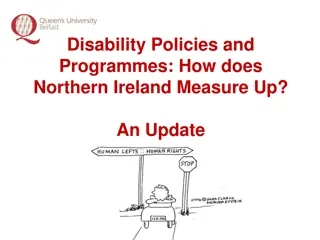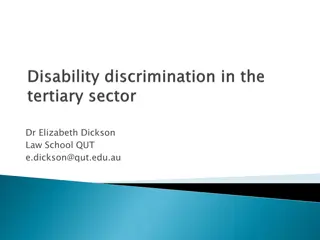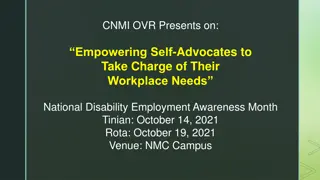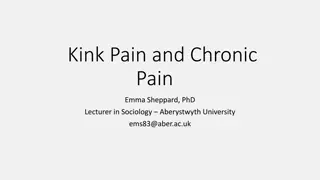Note Taker Training for Disability Services
Congratulations on being selected as a note taker for Disability Services! This training provides guidelines for note takers, reasons for note taking accommodations, and benefits for both students and note takers. Learn about the laws protecting students with disabilities, eligibility for note taking services, academic situations requiring note takers, and the advantages of receiving and providing notes. Note takers will receive compensation and gain valuable experience. Join the Student Disability Resource Center for an impactful role in supporting fellow students.
- Disability Services
- Note Taker Training
- Students with Disabilities
- Note Taking Accommodations
- Student Support
Download Presentation

Please find below an Image/Link to download the presentation.
The content on the website is provided AS IS for your information and personal use only. It may not be sold, licensed, or shared on other websites without obtaining consent from the author. Download presentation by click this link. If you encounter any issues during the download, it is possible that the publisher has removed the file from their server.
E N D
Presentation Transcript
Student Disability Resource Center Note taker Training 9/30/2024 2
Congratulations on being selected as a Note taker for Disability Services! Here are a few items you need to complete: Read and review the guidelines on the Note Taker Polices and Procedures Sheet and fill-out the Note Taker Application and either bring to or email to sdrc@cuc.claremont.edu Review this PowerPoint presentation and send an email to sdrc@cuc.claremont.edu to let us know that you completed the training. 3
Why does Disability Services provide note taking accommodations? The Government has established laws to protect the civil rights of citizens/students with disabilities. For further information, click on the following links. Americans with Disabilities Act (ADA) 1990 Amended 2008. www.ada.gov Section 504 of the Rehabilitation Act of 1973. http://www.hhs.gov/ocr/504.html o o 4
Students eligible for note taking services There are many different reasons why students registered with Disability Services may be requesting a volunteer note taker. Examples include: Students who are hard of hearing or deaf. Students with low vision or who are blind. Students with dexterity/motor skill difficulty. Students with learning disabilities. Students with ADD/ADHD. 5
Academic situations where a note taker might be needed Class or lab lectures Class discussion Classguest speakers Classvideosorfilms Classfield trips or experiential learning 6
What are the benefits for the student receiving notes? Allows student to focus on the instructor. Provides student with accurate information. Increases student s confidence. Student knows that he/she is receiving accurate information. Gives student access to classroom information that may have otherwise been missed. Gives student the opportunity to participate in classroom discussion. Supplements the student s notes and provides a tool for note taking improvement. 7
What are the Benefits for the Note taker? Note takers will be compensated at the end of the semester. Note taking is a valuable experience that students can include on their resumes. 8
Note taking Guidelines When you sign and return the Note taker application you are agreeing to the following guidelines: 1 Be on time. 2 Take notes for assigned student only. 3 Give notes to student after each class (carbonless notebooks are available in the SDRC to facilitate giving the notes to students right after class), deliver to them electronically (which usually means via email) or whichever was is best for the student to receive the notes from you. 4 If unable to attend class, please let the Campus Disability Coordinator know so that they can work with the professor and/or class to get the notes to the student. 5 Amount of compensation will be prorated according to campus compensation policy, if note taker drops the course or does not satisfactorily fulfill note taking obligations. 6 Students who have a note taker understand that receiving notes is not a substitute for class attendance. 9
Other important items to consider Note takers must practice confidentiality and not share any information regarding the student that they are providing notes for. Note takers must provide notes in a timely manner. Note takers should do their best to provide the instructor s information, views and opinions and should refrain from interjecting their own opinions in this information. Note takers are not be expected to tutor, and are not obligated to provide notes to a student who is not attending class. Note takers should follow up with their home campus Disability Coordinator, if there are any questions/concerns. 10
Note taking Materials Note takers may use free carbonless note taking paper available at the Student Disability Resource Center. Note takers may also use their own paper and make free copies of their notes at the Student Disability Resource Center. Note takers should take notes on a laptop, if this is the most optimal and effective way of taking notes for a particular class. 11
Strategies to assist you in taking more accurate, complete, and organized notes Use a ball point pen for note taking. If using carbonless paper, do not stack paper on top of each other. Put a heading and a date on your notes for each class session. If possible, use a similar note taking format throughout the semester. Leave margin space on the paper for the student to add his/her own comments later. Make sure your handwriting is legible. Correct spelling errors and make sure all abbreviations have been properly identified. 12
Note taking Formats The following slides provide you with examples of note taking formats you might wish to use. Two-Column Format Outline Format Paragraph Format 13
Example of a Note taking Format RCS 6080 Prof. Swett (Header info on 1st page) (Date & number each page) 02/03/06 Page 1 Two-Column Format Use this column to emphasize Key Points Use this column for taking notes as usual. Mood Disorders Depression: Treatment oPsychotherapy oECT Electro Convulsive Therapy oMedications > prozac, Zoloft, wellbutrin Vocational Applications oMiss work & lower productivity Accommodation oChange work environment Bibolar Disorder Manic-depressive Episodes of depression an mania Elevated mood swings Symptoms oGrandiosity, der. Sleep, rushed speech With mania - sometimes hallucinations Follow a depression episode Treatment oIndividual psycho-therapy oMedications Lithium, depakote, zyprexa oCrisis stabilitation Recommendations for internship sites: 1.Meridian 2.Vista 3.Metamorphosis Jeremy Lott guest speak jlott@ufl.edu Psychiatric Disorders Note: Jermey s PowerPoint presentation will be posted on Dr. Swett s webpage Note: There is Bipolar I And Bipolar II Intern ship Sites for Psychiatric Disorders Fold paper or use ruler to make dividing line. Take notes as usual in larger column. Fill in key points column with words or phrases to alert you. 14
Example of a Note taking Format RCS 6080 Prof. Swett (Header info on 1st page) (Date & number every page) 02/04/06 Page 1 Outline Format I. Persons With Disabilities (PWD) labeling A. Language 1. 2. If unsure 1. 2. PWD places person first Helps decrease labeling & stereotyping Label outline levels. Be consistent in your labeling. Each level can be one word or short phrase. Leave space for editing later. B. Ask person may have a cultural preference a. Deaf II. Categories of Disabilities A. Physical B. Visual (sensory) C. Cognitive D. Hearing (sensory) III. Rehabilitation Disciplines A. Physiatry 1. non-surgical (therapy) a. emphasis is reconditioning B. Physical Therapy (PT) 1. mobility & strength C. Occupational Therapy (OT) 1. activities of daily living (ALD) D. Speech Language Therapy 1. expressive & receptive skills 2. eating & swallowing E. Rehab counselor 1. case manager a. discharge planning Physiatry: physis (nature) + iatreia (healing) = rehabilitation 15
Examples of Note taking Format RCS 6080 Prof. Swett (Header info on 1st page) (Date & umber every page) 02/04/06 Page 1 Paragraph Format Persons With Disabilities (PWD) & Rehabilitation Disciplines Person first language places the person before the disability. This helps decrease labeling and stereotyping. If you are unsure how to address a PWD ask them for their preference. For example some people that are deaf or blind prefer to acknowledge their disability first for cultural reasons. Each sentence should express a complete thought. Categories of Disabilities include: Keep paragraphs short. Physical Visual (sensory) Cognitive Hearing (sensory) Make sure important info is not buried in the text. There are various types of disciplines within rehabilitation. These disciplines may include: Physiatry which takes a non-surgical approach (therapy) to rehabilitation. The emphasis is on reconditioning. Physical therapy works directly with mobility. Occupational therapy works specifically with activities of daily living. Speech language therapy increase expressive and receptive language skills and also assists in developing chewing and swallowing skills. Rehab counselors often referred to as case managers are mostly involved in outpatient discharge planning. Leave plenty of white space for editing notes. Physiatry: physis (nature) + iatreia (healing) = rehabilitation 16
Other Strategies Teacher Clues Lecture Clues Right before a professor presents important lecture points he/she may say something like, it is really important to remember that or you should remember that Professors say these statements to let students know that the information that follows is really important stuff. Of course, the obvious lecture clue is this will be on the test. 17
Other Strategies Professor Clues Notes off the board (or overhead/PPT) If the professor writes or spells words, write them down along with detailed information about the word. Usually, a professor will spell new vocabulary or really important words. If the professor places information on the board or overhead/PPT, it should be in your notes. 18
What to know if you are taking notes for a student who has a hearing loss. Get the student s feedback on the quality of the notes. Face student and speak directly to him/her. Obtain the student s attention by waving your hand or lightly tapping on student s shoulder. Visit www.ntid.rit.edu/elearning. The National Technical Institute for the Deaf for further information on training of note takers for a student with hearing loss. 19
Completing Note taker Training Verify completion of your volunteer note taker training by clicking on this email address sdrc@cuc.claremont.edu and place the following information exactly as stated in the subject line of the email: Volunteer Note taker Training Completed ____________________________________ (insert your first and last name here) Please leave the body of your email blank. 20
References Boyle, Joseph R. PhD. (2001). Enhancing the Note-Taking Skills of Students with Mild Disabilities. 1-7. Learning Disabilities OnLine. Retrieved September 8, 2003, from www.ldonline.com Boyle, Joseph R. (2001). Helping Students to Become Better Note-Takers Through Better Lectures. 1-7. Learning Disabilities OnLine. Retrieved September 8, 2003, from www.ldonline.org Boyle, Joseph R. & Weishaar, Mary Konya. (n.d.) Note-Taking for Students with Mild Disabilities: The Art of Note-Taking. 1-2. Family Education Network. Retrieved September 8, 2003, from www.familyeducation.com University of Colorado at Boulder. (n.d.) Online Note taker Training. Retrieved 04/17/2008, from www.colorado.edu/disabilityservices/notetaking/mod01/html University of Florida. (n.d.) Note-taker Training Disability Resource Center Retrieved 04/17/2008, from http://www.dso.ufl.edu/drc/ 21
Contact Information Campus Disability Coordinators Student Disability Resource Center Scripps College Leslie Schnyder Phone E-mail (909) 607-7419 sdrc@cuc.claremont.edu LSchnyde@scrippscollege.edu Pitzer College Danny Hernandez Danny_Hernandez@pitzer.edu Address Pomona College Tranquada Student Services Center, 1st floor 757 College Way Claremont, CA 91711 Jan Collins-Eaglin Jan.Collins-Eaglin@pomona.edu Claremont McKenna College Julia Easley julia.easley@claremontmckenna.edu Keck Graduate Institute Student Services Student_services@kgi.edu Harvey Mudd College Deborah Kahn Dkahn@hmc.edu Claremont Graduate University Chris Bass Chris.Bass@cgu.edu 22


